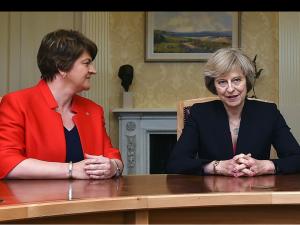
By PA reporter
Theresa May remains committed to a £1 billion investment in Northern Ireland despite the continued deadlock in Stormont powersharing, a senior Downing Street source has said.
The Government is understood to be standing by the controversial deal struck by the Tories in return for Democratic Unionist votes at Westminster, while making preparations to impose a budget on the region by the end of the month.
Secretary of State James Brokenshire said public services in Northern Ireland would begin to run out of money by the end of November.
And while the Prime Minister's official spokesman said the priority was getting the Stormont Assembly back up and running, another senior source in Downing Street insisted that the £1 billion investment still stands.
"The money that has been promised as part of the confidence and supply deal is for the people of Northern Ireland and we are committed to delivering on that undertaking," the source said.
The DUP and Sinn Fein failed to meet Mr Brokenshire's original Monday deadline for a powersharing deal, after Stormont had been effectively in limbo since January.
Irish language rights and other cultural issues are the main sticking points.
And the 10 month long crisis prompted renewed calls for MLAs' pay - £49,500 a year - to be cut.
Steven Agnew, Green Party leader in Northern Ireland, said: " If an MLA is performing two-thirds of a job, they should be paid two-thirds of the wage."
Sinn Fein's northern leader Michelle O'Neill said negotiations had been hampered by the Westminster votes deal.
She said: "This has been compounded by the Tory-DUP pact. The British Secretary of State is wrong when he says that it is only the parties themselves who can reach agreement - he and the Irish Government also have obligations."
DUP MP Gregory Campbell accused Sinn Fein of "rank hypocrisy" over the deadlock at Stormont and said his party was ready to form an executive.
"We want devolution. Arlene Foster has led our talks team and is rightly frustrated that government is being held back by a narrow political agenda," he said.
"We received an overwhelming mandate to ensure any deal was fair. That mandate has to be respected, just as we respect the mandate of others."
SDLP leader Colum Eastwood said the threatened budget was direct rule and warned that people in Northern Ireland were deeply worried.
"A Tory/DUP Government will do nothing for the rights of people in the north. It only strengthens the DUP's intransigence," he said.
"It will do nothing for the rights of Irish language speakers, the LGBT community or victims."
Ulster Unionist Party leader Robin Swann said: "Northern Ireland is now coming slowly and deliberately to direct rule, at the hands of Sinn Fein and the DUP."
Green Party leader Steven Agnew said there had been a blackout on what issues the Sinn Fein and the DUP cannot agree on.
"What we now need from the Secretary of State is a concerted effort to introduce transparency, creativity and inclusivity into negotiations, to end the blackout on what the sticking points are and to listen to alternative approaches," he said.
Mr Brokenshire said important progress has been made in the talks but it was unlikely the Stormont executive could be revived in time for Northern Ireland's politicians to determine the budget by the end of the month.
"No Government could simply stand by and allow that to happen," he said.
Mr Brokenshire said he was taking advice on the issue of pay for MLAs - a £49,500 salary with about £41,250 paid to the 90 MLAs in the months since Stormont has been shut.
He said talks cannot run indefinitely but the latest deadline should not be seen as a reason to abandon them.
"I think there is already a huge amount of frustration out there in Northern Ireland, that people here want to see politics here get on with the job and serving them," he said.
"Yes, this has gone on for an extended period, but I still think it is right that we use renewed efforts to find a resolution to see devolved government get back on its feet again.
"It's because it matters so much - that local accountability, local politicians serving here in Northern Ireland. But they can't merely continue forever and a day."
Ireland's Foreign Minister Simon Coveney, who had been involved in the talks earlier this week, said London was acting reluctantly and delaying a threatened budget as late as possible.
"Both Governments share the view that it is regrettable and deeply concerning that, eight months after the last Assembly election, a powersharing executive is not in place to make the necessary decisions, including on budgetary issues, for Northern Ireland," he said.
In their statements, Mr Coveney and Mr Brokenshire also noted the importance of the Good Friday Agreement.
Mr Coveney said the relationship between the parties was at the heart of the issue.
"The issues under discussion - particularly those on language and culture - go to the heart of the divisions in society here in Northern Ireland and so agreement on them was always going to be very challenging," he said.
"However, I have always believed that it is possible to reach an honourable compromise which reflects the core principles of the agreement - partnership, equality and mutual respect."


 Mother and two children murdered in Maguiresbridge to be buried together By Jonathan McCambridge and Rebecca Black, PA
Mother and two children murdered in Maguiresbridge to be buried together By Jonathan McCambridge and Rebecca Black, PA
 Surgeon tasked with tackling waiting lists says they are a ‘national shame’
Surgeon tasked with tackling waiting lists says they are a ‘national shame’
 First Minister disappointed to not attend Belfast Pride this year
First Minister disappointed to not attend Belfast Pride this year
 Crowds expected at vigil for mother and children killed in Co Fermanagh shooting
Crowds expected at vigil for mother and children killed in Co Fermanagh shooting